Assessment of Cognitive and Neuropsychological Function: A Report
VerifiedAdded on 2020/12/18
|6
|1334
|303
Report
AI Summary
This report presents a neuropsychological assessment of an individual, RA, who experienced a traumatic brain injury. The report details the cognitive functions affected, primarily focusing on memory and executive functions, and identifies specific brain areas impacted, including the cerebral cortex and frontal and temporal lobes. It outlines various neuropsychological tests used for diagnosis, such as cognitive tests, communication and motor tests, and adaptive functionality assessments, while also addressing methodological issues that can influence test results. The report further explores the neuropsychological perspective that symptoms are not a result of malingering, using tests like the Trail Making Test and Stroop color and word tests to support this claim. Finally, it identifies conditions indicating that normal performance does not necessarily signify complete recovery, highlighting the persistence of cognitive deficits despite a return to routine activities. The report references several academic sources to support its findings.
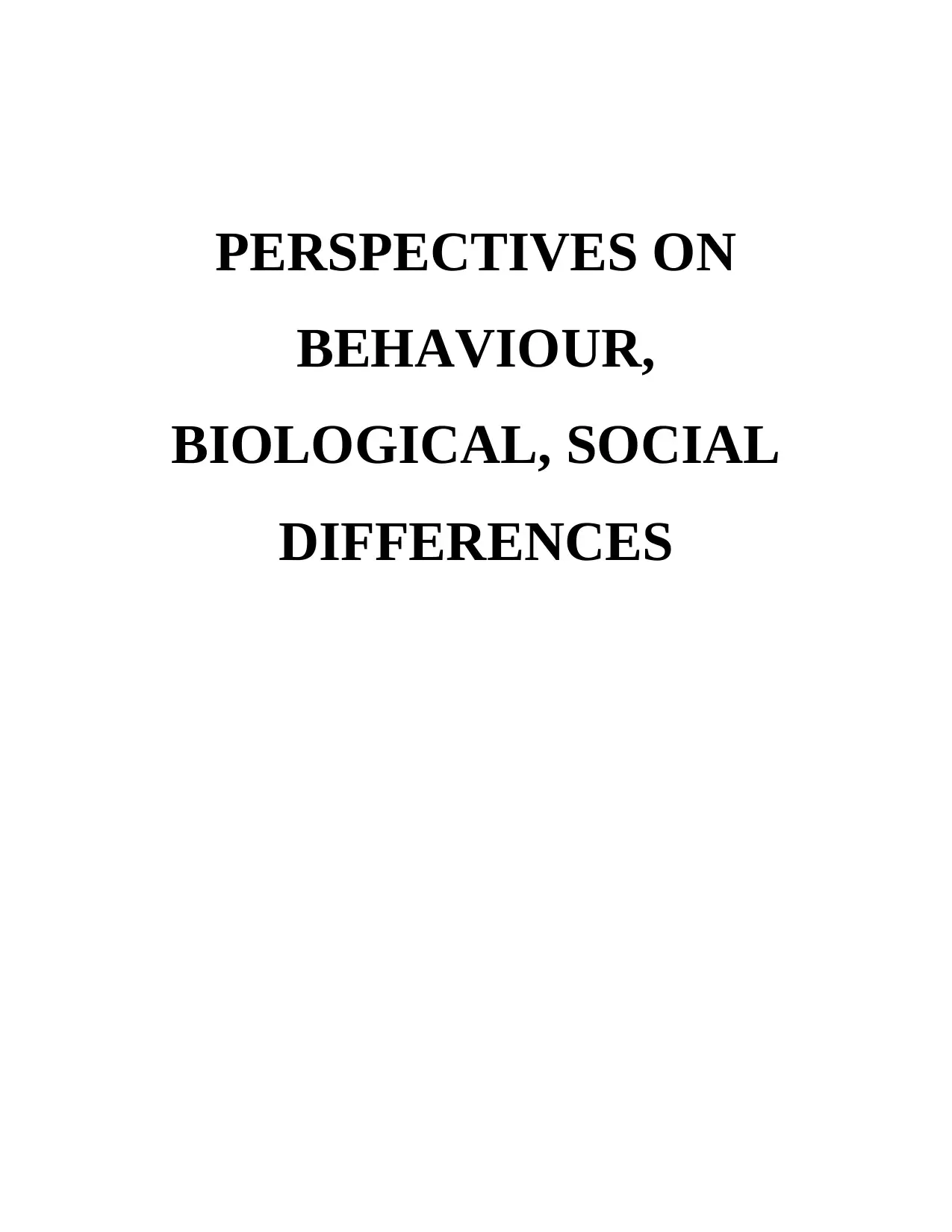
PERSPECTIVES ON
BEHAVIOUR,
BIOLOGICAL, SOCIAL
DIFFERENCES
BEHAVIOUR,
BIOLOGICAL, SOCIAL
DIFFERENCES
Paraphrase This Document
Need a fresh take? Get an instant paraphrase of this document with our AI Paraphraser
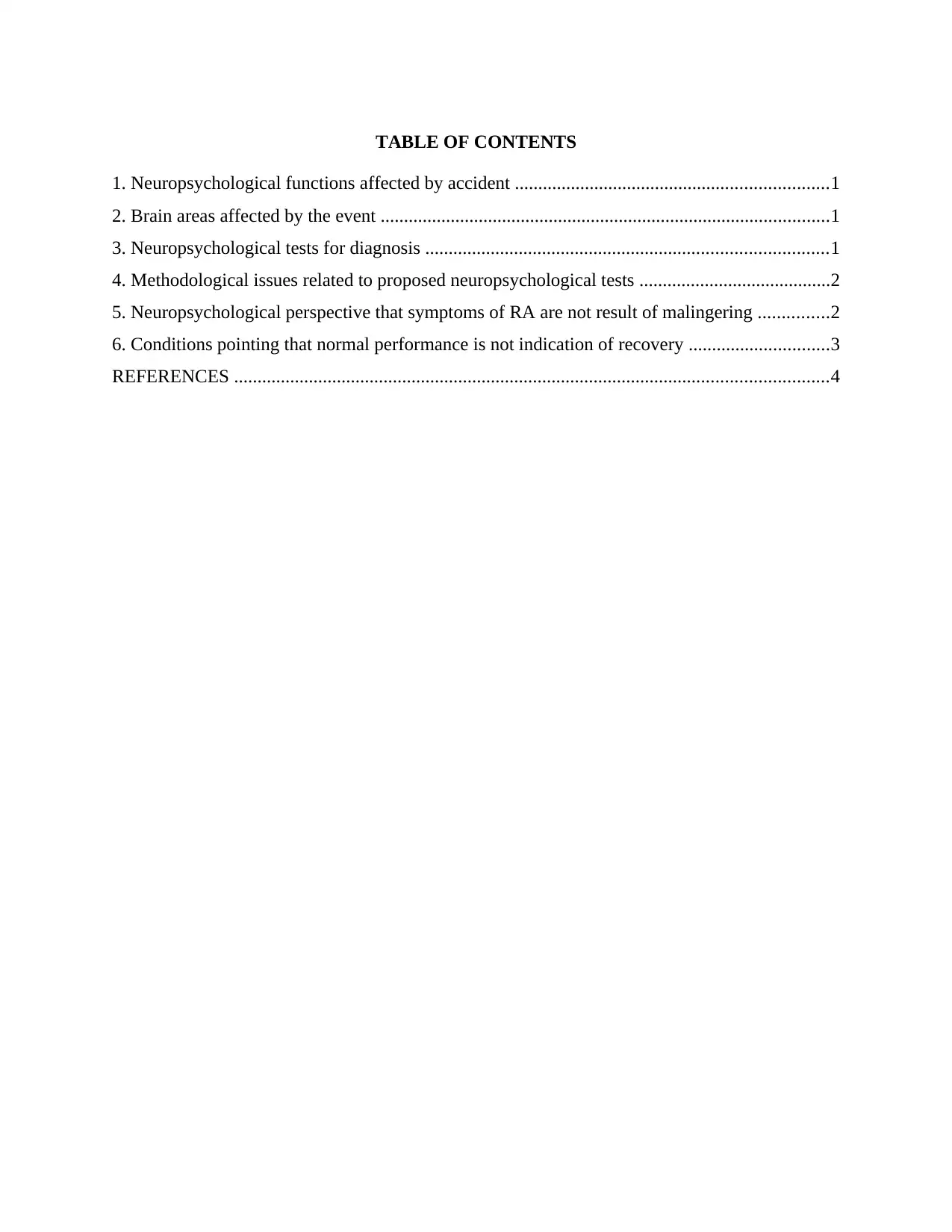
TABLE OF CONTENTS
1. Neuropsychological functions affected by accident ...................................................................1
2. Brain areas affected by the event ................................................................................................1
3. Neuropsychological tests for diagnosis ......................................................................................1
4. Methodological issues related to proposed neuropsychological tests .........................................2
5. Neuropsychological perspective that symptoms of RA are not result of malingering ...............2
6. Conditions pointing that normal performance is not indication of recovery ..............................3
REFERENCES ...............................................................................................................................4
1. Neuropsychological functions affected by accident ...................................................................1
2. Brain areas affected by the event ................................................................................................1
3. Neuropsychological tests for diagnosis ......................................................................................1
4. Methodological issues related to proposed neuropsychological tests .........................................2
5. Neuropsychological perspective that symptoms of RA are not result of malingering ...............2
6. Conditions pointing that normal performance is not indication of recovery ..............................3
REFERENCES ...............................................................................................................................4
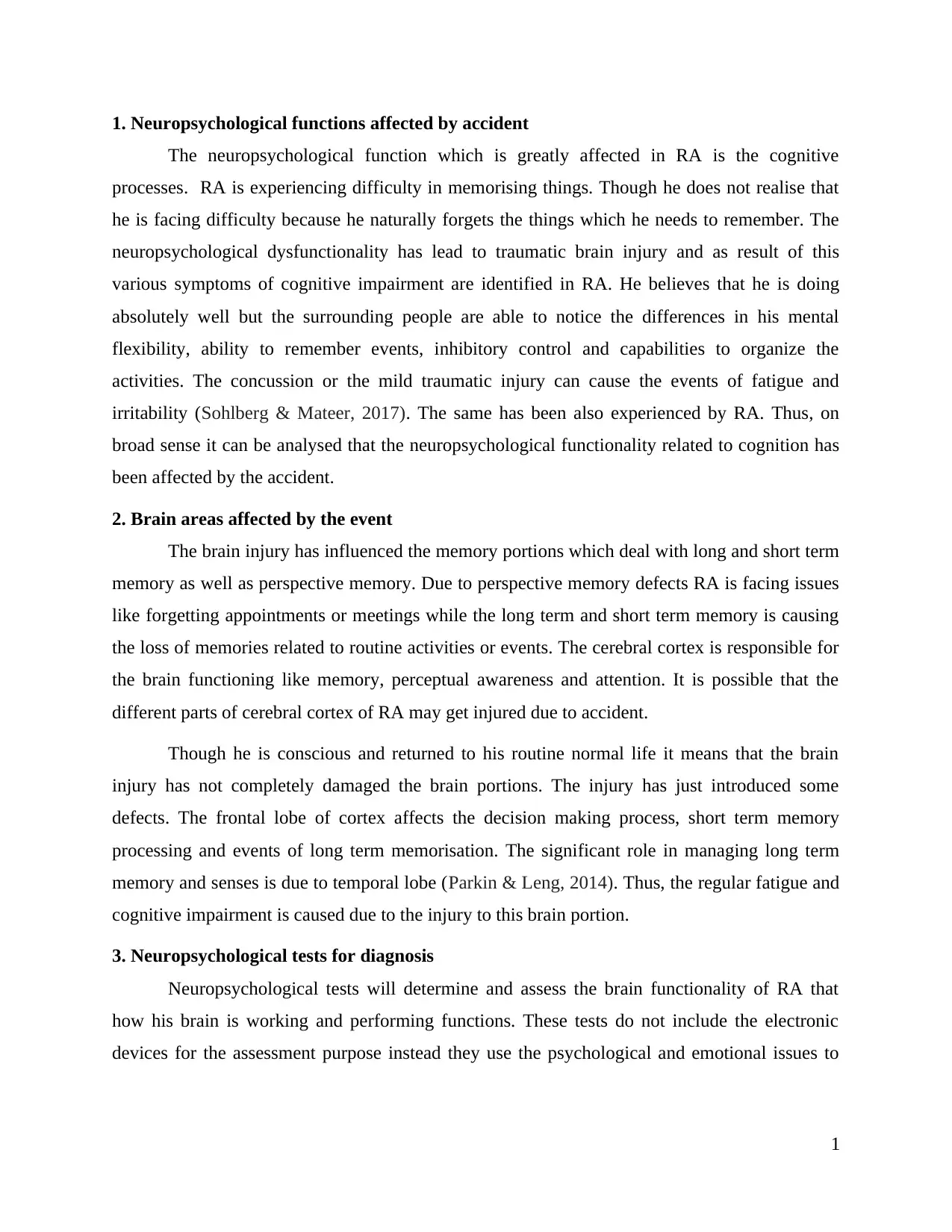
1. Neuropsychological functions affected by accident
The neuropsychological function which is greatly affected in RA is the cognitive
processes. RA is experiencing difficulty in memorising things. Though he does not realise that
he is facing difficulty because he naturally forgets the things which he needs to remember. The
neuropsychological dysfunctionality has lead to traumatic brain injury and as result of this
various symptoms of cognitive impairment are identified in RA. He believes that he is doing
absolutely well but the surrounding people are able to notice the differences in his mental
flexibility, ability to remember events, inhibitory control and capabilities to organize the
activities. The concussion or the mild traumatic injury can cause the events of fatigue and
irritability (Sohlberg & Mateer, 2017). The same has been also experienced by RA. Thus, on
broad sense it can be analysed that the neuropsychological functionality related to cognition has
been affected by the accident.
2. Brain areas affected by the event
The brain injury has influenced the memory portions which deal with long and short term
memory as well as perspective memory. Due to perspective memory defects RA is facing issues
like forgetting appointments or meetings while the long term and short term memory is causing
the loss of memories related to routine activities or events. The cerebral cortex is responsible for
the brain functioning like memory, perceptual awareness and attention. It is possible that the
different parts of cerebral cortex of RA may get injured due to accident.
Though he is conscious and returned to his routine normal life it means that the brain
injury has not completely damaged the brain portions. The injury has just introduced some
defects. The frontal lobe of cortex affects the decision making process, short term memory
processing and events of long term memorisation. The significant role in managing long term
memory and senses is due to temporal lobe (Parkin & Leng, 2014). Thus, the regular fatigue and
cognitive impairment is caused due to the injury to this brain portion.
3. Neuropsychological tests for diagnosis
Neuropsychological tests will determine and assess the brain functionality of RA that
how his brain is working and performing functions. These tests do not include the electronic
devices for the assessment purpose instead they use the psychological and emotional issues to
1
The neuropsychological function which is greatly affected in RA is the cognitive
processes. RA is experiencing difficulty in memorising things. Though he does not realise that
he is facing difficulty because he naturally forgets the things which he needs to remember. The
neuropsychological dysfunctionality has lead to traumatic brain injury and as result of this
various symptoms of cognitive impairment are identified in RA. He believes that he is doing
absolutely well but the surrounding people are able to notice the differences in his mental
flexibility, ability to remember events, inhibitory control and capabilities to organize the
activities. The concussion or the mild traumatic injury can cause the events of fatigue and
irritability (Sohlberg & Mateer, 2017). The same has been also experienced by RA. Thus, on
broad sense it can be analysed that the neuropsychological functionality related to cognition has
been affected by the accident.
2. Brain areas affected by the event
The brain injury has influenced the memory portions which deal with long and short term
memory as well as perspective memory. Due to perspective memory defects RA is facing issues
like forgetting appointments or meetings while the long term and short term memory is causing
the loss of memories related to routine activities or events. The cerebral cortex is responsible for
the brain functioning like memory, perceptual awareness and attention. It is possible that the
different parts of cerebral cortex of RA may get injured due to accident.
Though he is conscious and returned to his routine normal life it means that the brain
injury has not completely damaged the brain portions. The injury has just introduced some
defects. The frontal lobe of cortex affects the decision making process, short term memory
processing and events of long term memorisation. The significant role in managing long term
memory and senses is due to temporal lobe (Parkin & Leng, 2014). Thus, the regular fatigue and
cognitive impairment is caused due to the injury to this brain portion.
3. Neuropsychological tests for diagnosis
Neuropsychological tests will determine and assess the brain functionality of RA that
how his brain is working and performing functions. These tests do not include the electronic
devices for the assessment purpose instead they use the psychological and emotional issues to
1
⊘ This is a preview!⊘
Do you want full access?
Subscribe today to unlock all pages.

Trusted by 1+ million students worldwide
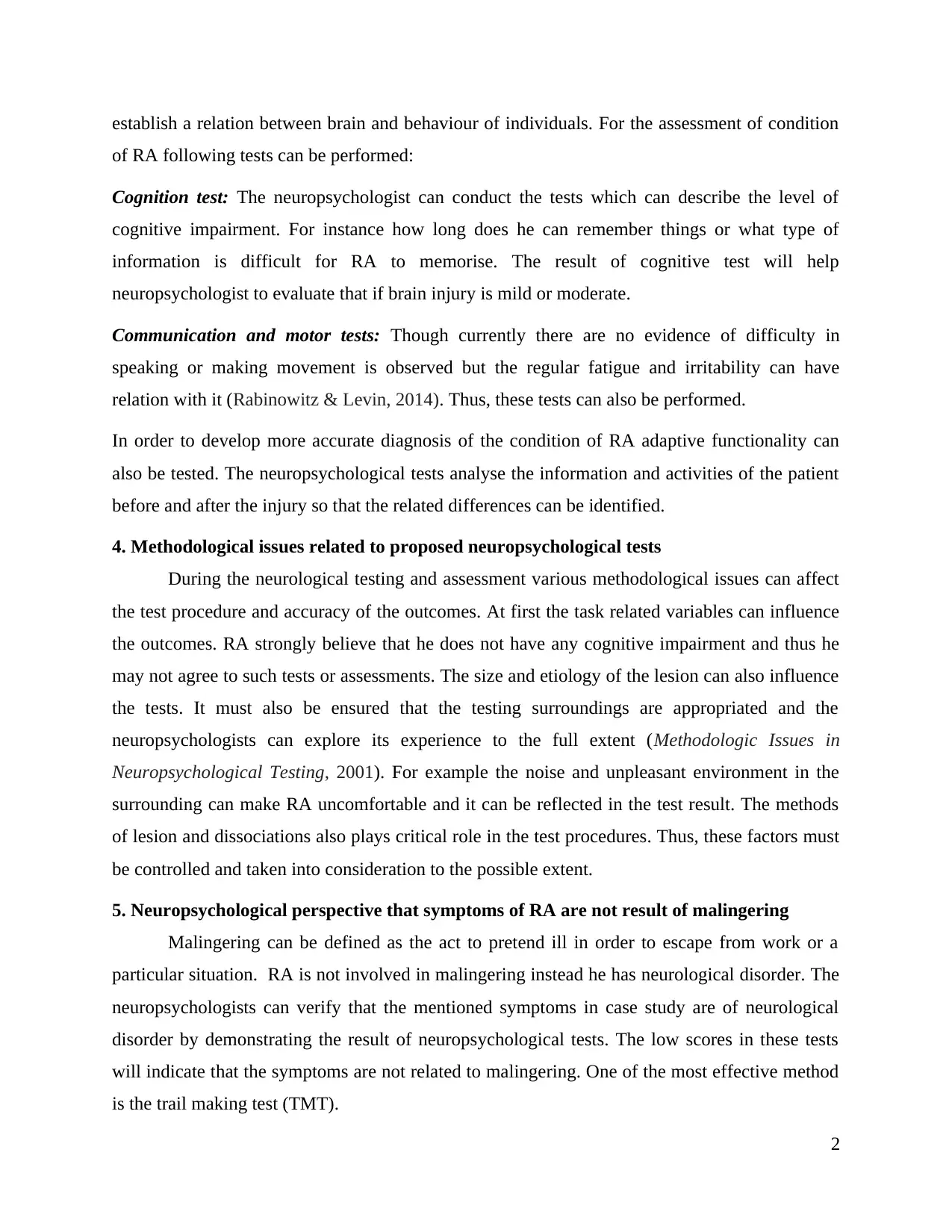
establish a relation between brain and behaviour of individuals. For the assessment of condition
of RA following tests can be performed:
Cognition test: The neuropsychologist can conduct the tests which can describe the level of
cognitive impairment. For instance how long does he can remember things or what type of
information is difficult for RA to memorise. The result of cognitive test will help
neuropsychologist to evaluate that if brain injury is mild or moderate.
Communication and motor tests: Though currently there are no evidence of difficulty in
speaking or making movement is observed but the regular fatigue and irritability can have
relation with it (Rabinowitz & Levin, 2014). Thus, these tests can also be performed.
In order to develop more accurate diagnosis of the condition of RA adaptive functionality can
also be tested. The neuropsychological tests analyse the information and activities of the patient
before and after the injury so that the related differences can be identified.
4. Methodological issues related to proposed neuropsychological tests
During the neurological testing and assessment various methodological issues can affect
the test procedure and accuracy of the outcomes. At first the task related variables can influence
the outcomes. RA strongly believe that he does not have any cognitive impairment and thus he
may not agree to such tests or assessments. The size and etiology of the lesion can also influence
the tests. It must also be ensured that the testing surroundings are appropriated and the
neuropsychologists can explore its experience to the full extent (Methodologic Issues in
Neuropsychological Testing, 2001). For example the noise and unpleasant environment in the
surrounding can make RA uncomfortable and it can be reflected in the test result. The methods
of lesion and dissociations also plays critical role in the test procedures. Thus, these factors must
be controlled and taken into consideration to the possible extent.
5. Neuropsychological perspective that symptoms of RA are not result of malingering
Malingering can be defined as the act to pretend ill in order to escape from work or a
particular situation. RA is not involved in malingering instead he has neurological disorder. The
neuropsychologists can verify that the mentioned symptoms in case study are of neurological
disorder by demonstrating the result of neuropsychological tests. The low scores in these tests
will indicate that the symptoms are not related to malingering. One of the most effective method
is the trail making test (TMT).
2
of RA following tests can be performed:
Cognition test: The neuropsychologist can conduct the tests which can describe the level of
cognitive impairment. For instance how long does he can remember things or what type of
information is difficult for RA to memorise. The result of cognitive test will help
neuropsychologist to evaluate that if brain injury is mild or moderate.
Communication and motor tests: Though currently there are no evidence of difficulty in
speaking or making movement is observed but the regular fatigue and irritability can have
relation with it (Rabinowitz & Levin, 2014). Thus, these tests can also be performed.
In order to develop more accurate diagnosis of the condition of RA adaptive functionality can
also be tested. The neuropsychological tests analyse the information and activities of the patient
before and after the injury so that the related differences can be identified.
4. Methodological issues related to proposed neuropsychological tests
During the neurological testing and assessment various methodological issues can affect
the test procedure and accuracy of the outcomes. At first the task related variables can influence
the outcomes. RA strongly believe that he does not have any cognitive impairment and thus he
may not agree to such tests or assessments. The size and etiology of the lesion can also influence
the tests. It must also be ensured that the testing surroundings are appropriated and the
neuropsychologists can explore its experience to the full extent (Methodologic Issues in
Neuropsychological Testing, 2001). For example the noise and unpleasant environment in the
surrounding can make RA uncomfortable and it can be reflected in the test result. The methods
of lesion and dissociations also plays critical role in the test procedures. Thus, these factors must
be controlled and taken into consideration to the possible extent.
5. Neuropsychological perspective that symptoms of RA are not result of malingering
Malingering can be defined as the act to pretend ill in order to escape from work or a
particular situation. RA is not involved in malingering instead he has neurological disorder. The
neuropsychologists can verify that the mentioned symptoms in case study are of neurological
disorder by demonstrating the result of neuropsychological tests. The low scores in these tests
will indicate that the symptoms are not related to malingering. One of the most effective method
is the trail making test (TMT).
2
Paraphrase This Document
Need a fresh take? Get an instant paraphrase of this document with our AI Paraphraser
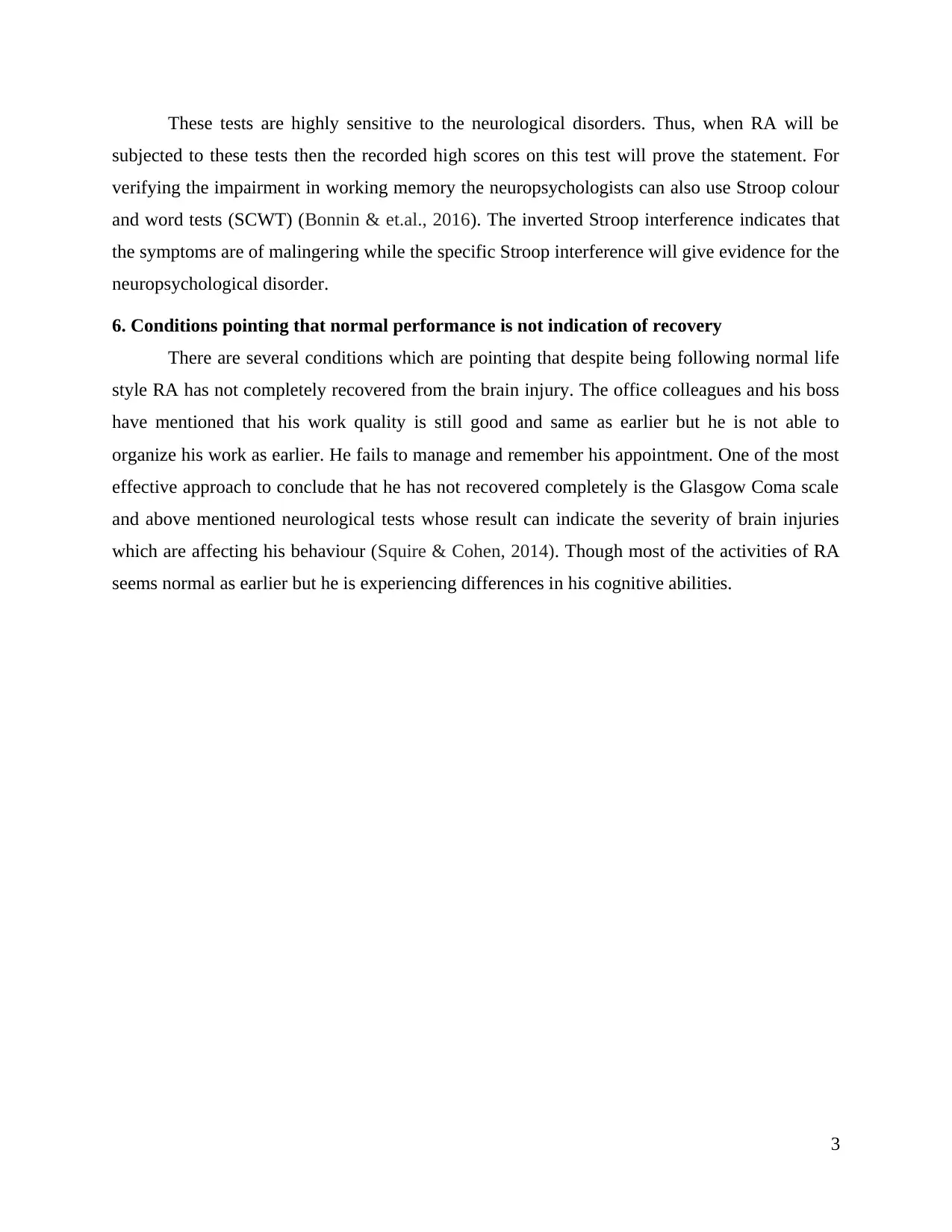
These tests are highly sensitive to the neurological disorders. Thus, when RA will be
subjected to these tests then the recorded high scores on this test will prove the statement. For
verifying the impairment in working memory the neuropsychologists can also use Stroop colour
and word tests (SCWT) (Bonnin & et.al., 2016). The inverted Stroop interference indicates that
the symptoms are of malingering while the specific Stroop interference will give evidence for the
neuropsychological disorder.
6. Conditions pointing that normal performance is not indication of recovery
There are several conditions which are pointing that despite being following normal life
style RA has not completely recovered from the brain injury. The office colleagues and his boss
have mentioned that his work quality is still good and same as earlier but he is not able to
organize his work as earlier. He fails to manage and remember his appointment. One of the most
effective approach to conclude that he has not recovered completely is the Glasgow Coma scale
and above mentioned neurological tests whose result can indicate the severity of brain injuries
which are affecting his behaviour (Squire & Cohen, 2014). Though most of the activities of RA
seems normal as earlier but he is experiencing differences in his cognitive abilities.
3
subjected to these tests then the recorded high scores on this test will prove the statement. For
verifying the impairment in working memory the neuropsychologists can also use Stroop colour
and word tests (SCWT) (Bonnin & et.al., 2016). The inverted Stroop interference indicates that
the symptoms are of malingering while the specific Stroop interference will give evidence for the
neuropsychological disorder.
6. Conditions pointing that normal performance is not indication of recovery
There are several conditions which are pointing that despite being following normal life
style RA has not completely recovered from the brain injury. The office colleagues and his boss
have mentioned that his work quality is still good and same as earlier but he is not able to
organize his work as earlier. He fails to manage and remember his appointment. One of the most
effective approach to conclude that he has not recovered completely is the Glasgow Coma scale
and above mentioned neurological tests whose result can indicate the severity of brain injuries
which are affecting his behaviour (Squire & Cohen, 2014). Though most of the activities of RA
seems normal as earlier but he is experiencing differences in his cognitive abilities.
3
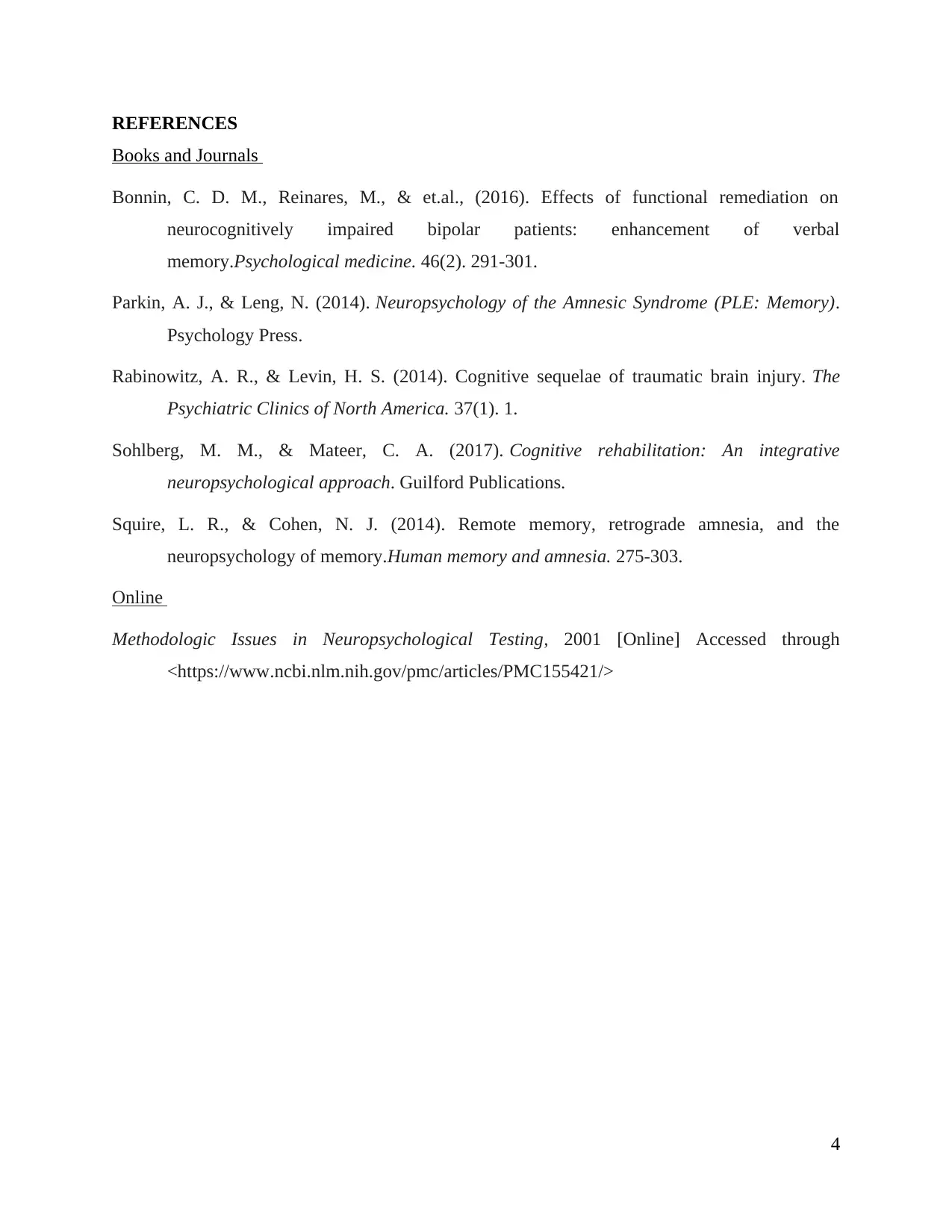
REFERENCES
Books and Journals
Bonnin, C. D. M., Reinares, M., & et.al., (2016). Effects of functional remediation on
neurocognitively impaired bipolar patients: enhancement of verbal
memory.Psychological medicine. 46(2). 291-301.
Parkin, A. J., & Leng, N. (2014). Neuropsychology of the Amnesic Syndrome (PLE: Memory).
Psychology Press.
Rabinowitz, A. R., & Levin, H. S. (2014). Cognitive sequelae of traumatic brain injury. The
Psychiatric Clinics of North America. 37(1). 1.
Sohlberg, M. M., & Mateer, C. A. (2017). Cognitive rehabilitation: An integrative
neuropsychological approach. Guilford Publications.
Squire, L. R., & Cohen, N. J. (2014). Remote memory, retrograde amnesia, and the
neuropsychology of memory.Human memory and amnesia. 275-303.
Online
Methodologic Issues in Neuropsychological Testing, 2001 [Online] Accessed through
<https://www.ncbi.nlm.nih.gov/pmc/articles/PMC155421/>
4
Books and Journals
Bonnin, C. D. M., Reinares, M., & et.al., (2016). Effects of functional remediation on
neurocognitively impaired bipolar patients: enhancement of verbal
memory.Psychological medicine. 46(2). 291-301.
Parkin, A. J., & Leng, N. (2014). Neuropsychology of the Amnesic Syndrome (PLE: Memory).
Psychology Press.
Rabinowitz, A. R., & Levin, H. S. (2014). Cognitive sequelae of traumatic brain injury. The
Psychiatric Clinics of North America. 37(1). 1.
Sohlberg, M. M., & Mateer, C. A. (2017). Cognitive rehabilitation: An integrative
neuropsychological approach. Guilford Publications.
Squire, L. R., & Cohen, N. J. (2014). Remote memory, retrograde amnesia, and the
neuropsychology of memory.Human memory and amnesia. 275-303.
Online
Methodologic Issues in Neuropsychological Testing, 2001 [Online] Accessed through
<https://www.ncbi.nlm.nih.gov/pmc/articles/PMC155421/>
4
⊘ This is a preview!⊘
Do you want full access?
Subscribe today to unlock all pages.

Trusted by 1+ million students worldwide
1 out of 6
Related Documents
Your All-in-One AI-Powered Toolkit for Academic Success.
+13062052269
info@desklib.com
Available 24*7 on WhatsApp / Email
![[object Object]](/_next/static/media/star-bottom.7253800d.svg)
Unlock your academic potential
Copyright © 2020–2026 A2Z Services. All Rights Reserved. Developed and managed by ZUCOL.





